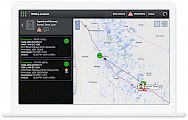
Quality Assurance
Uncover issues before users do.
Deliver quality products and smooth experiences every time.
A dysfunctional software application is a major irritant for your users and clients, and can affect your company’s reputation. Don’t risk going to launch without the peace of mind that comes with a solid quality assurance program supporting the entire software development process. You can enjoy the confidence of launching the best possible version of your application, rather than wasting valuable time and resources later on fixes for usability and stability, or security updates.
Spiria offers complete quality assurance services for the applications we develop for you, as well as for those developed by your own teams or third party suppliers. Our skilled QA team helps you improve your own quality processes and provides expertise in automated functional tests. We can build any UI and API automated test to address any issue. We have developed our own automation frameworks, based on Java, Junit, JavaScript, Python, Pytest, Protractor, Cypress, Selenium and Appium, (which can be deployed via Docker), to respond quickly to the most common requirements.
["\/site\/assets\/files\/6634\/dev_0.svg","\/site\/assets\/files\/7666\/dev_1.svg","\/site\/assets\/files\/7668\/dev_2.svg","\/site\/assets\/files\/7670\/dev_3.svg","\/site\/assets\/files\/7672\/dev_4.svg"]
[[-200,-320,-450,-480,-430],[-200,-320,-430,-450,-430],[-300,-200,-240,-220,-450],[-300,-200,-240,-220,-450]]
Recent Articles

Announcement : Spiria is certified SOC 2 Type 2
A seal of confidence and security for our customers
We are proud to announce that we have achieved SOC 2 Type 2 certification, an internationally recognized certification that attests to the high quality and reliability of our services. This certification is proof not only of our ability, but above all of our commitment to protecting our customers’ data and complying with best practices in terms of data security.

What does a Great Place to Work Canada® look like?
I’ve been reflecting on the nine years I’ve been at Spiria, and this past one has been a source of pride. Our Culture and Talents team shines with accomplishments that include setting up policies, processes, and initiatives that make our teams’ lives much easier, at work but also at home.

Choosing Between a Time-and-Materials or a Fixed-Price Contract
What are the advantages to each option, and how do you choose the one best suited for your software development project? What factors should guide your decision to go with a Time and Materials (T&M) project or with a Fixed-price contract?
Looking for Something More?
Transform your business through strategy, customer experience, design and development.
Our Services







